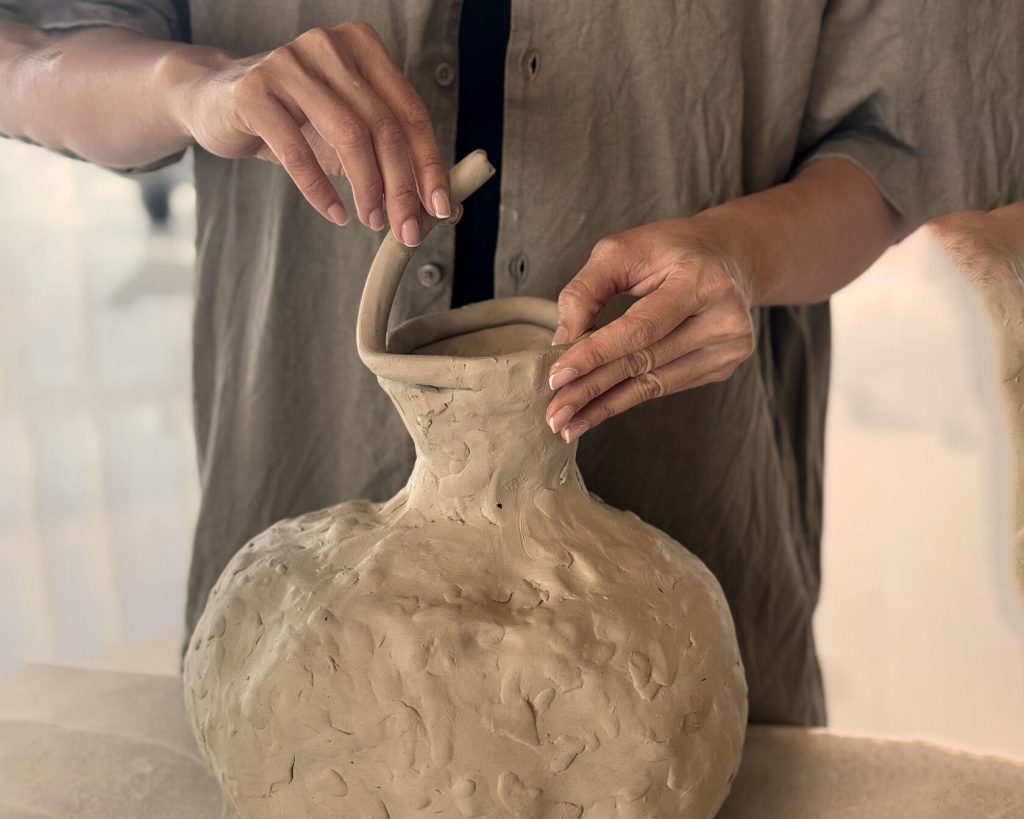Dubai may be known for steel towers and futuristic architecture, but it also nurtures age-old crafts like pottery. In recent years, we’ve seen a rise in workshops that teach pottery wheel techniques, especially in art-focused neighborhoods such as Alserkal Avenue and Jumeirah. These studios attract a mix of expats, locals, and tourists looking to unwind and create something tangible. Pottery in Dubai isn’t just about tradition; it’s about merging contemporary aesthetics with ancestral skills. Many studios provide short-term experiences or multi-week programs tailored to complete beginners or intermediate learners.
Studios often blend local motifs with Mediterranean or Japanese influences
In Dubai, pottery spaces rarely limit themselves to just technical instruction. Instead, they often fuse regional motifs with global influences. You might find a workshop that teaches you to craft a traditional Arabic coffee cup using Japanese wheel techniques. Others might focus on UAE-inspired textures or desert-toned glazes. This cross-cultural blending is typical of Dubai’s art scene. Instructors usually come from diverse ceramic backgrounds, and many hold degrees in visual arts or apprenticed under master potters. Learning pottery in Dubai becomes both a creative and cultural experience.
Classes typically focus on centering, pulling, and trimming techniques
For those curious about what pottery wheel training involves, the process usually begins with mastering centering. This is the technique of placing the clay firmly at the center of a spinning wheel. Students then learn how to open the clay and shape it using pulling and compression. More advanced sessions teach trimming excess clay and finishing the bottom of the vessel. Studios in Dubai invest in electric wheels that suit learners of all skill levels. Some even offer foot-pedal wheels for those who want an old-school experience. The environment is designed to be calming and meditative.
Sessions often run in cycles aligned with Dubai’s seasonal lifestyle
Dubai’s pottery workshops tend to follow the rhythm of the city’s lifestyle. Classes are more frequent between October and May when temperatures are milder, and cultural events are in full swing. Many programs offer weekend intensives or weekday evening sessions, catering to busy residents and visitors. It’s common for courses to be advertised as “ceramic retreats” that allow people to disconnect and focus inward. During Ramadan, classes might pause or adjust to night-time schedules. Planning around local holidays ensures a smoother experience.
Studios provide all materials, tools, and post-firing services
One of the great things about learning pottery in Dubai is that studios typically include all essentials in their fees. Clay, tools, aprons, and even firing costs are usually covered. Instructors guide participants through bisque firing and glazing, which are crucial for transforming soft clay into durable ceramics. After completing a piece, students often return a week later to collect their finished items. Most places also allow artists to keep their creations or display them in gallery corners within the studio. If a student wants to continue independently, some spaces rent out wheels and kiln time by the hour.

Alserkal Avenue remains the epicenter of ceramic education
If you’re looking for a reliable starting point, Alserkal Avenue in Al Quoz is home to several well-equipped ceramic studios. These spaces often host guest potters, artist talks, and collaborative exhibitions. The sense of community here adds depth to the learning process. Participants often stay after class to socialize, share snacks, or discuss technique. Being surrounded by painters, sculptors, and photographers adds a rich creative energy. This area is also well connected via major roads and accessible by ride-hailing services, which is helpful since many sessions run late into the evening.
Specialty classes cater to unique preferences and advanced skills
Beyond introductory workshops, some Dubai studios offer specialized classes. For example, there are sessions focused on creating porcelain teaware, large vases, or contemporary abstract forms. Others dive into glazing science, surface decoration, or clay chemistry. These are perfect for returning students who want to build on previous skills. Some workshops even provide mentorship programs or preparation for exhibiting in local art fairs. It’s worth asking about the instructor’s background before enrolling, especially if you’re seeking high-level coaching. The diversity of techniques taught makes each studio distinct.
Pottery is often paired with wellness and mindfulness activities
In line with Dubai’s wellness trend, several pottery spaces incorporate mindfulness into their curriculum. Some sessions begin with guided breathing or calming tea rituals. Others play ambient music and encourage silent crafting, treating wheel work like a form of meditation. The repetitive, tactile nature of pottery makes it an ideal escape from screen fatigue. Participants often describe the sessions as grounding and mentally restorative. In a city that moves fast, this slower rhythm offers balance.
Children’s pottery classes help foster creativity from a young age
Many Dubai studios have developed child-friendly versions of their adult programs. These classes use smaller wheels, soft clays, and bright colors to engage younger learners. Projects include making animal figures, mugs for parents, or decorative plates. Some studios collaborate with international schools or host art-themed birthday parties. For families residing in Dubai, this is a great way to add structured creativity into a child’s weekly routine. It also encourages focus, patience, and self-expression in ways that digital tools often can’t.
Pottery connects Dubai’s expat creatives and local art lovers
Ultimately, pottery workshops in Dubai have become community hubs where residents of different backgrounds meet through shared craft. You’re likely to sit next to a tech professional, a university student, and an art collector—all working clay side by side. The conversations often flow as freely as the spinning wheel. As Dubai grows its support for local arts, these micro-communities play a vital role in making creativity accessible.
This guide was crafted by the www.few.ae team to help you discover Dubai’s pottery wheel experiences with the insight of local creatives and educators.
